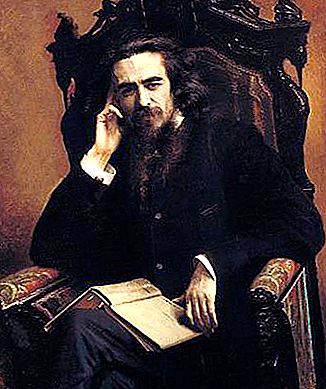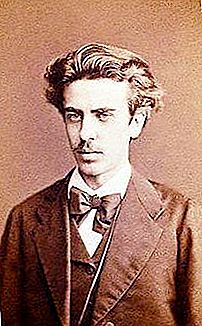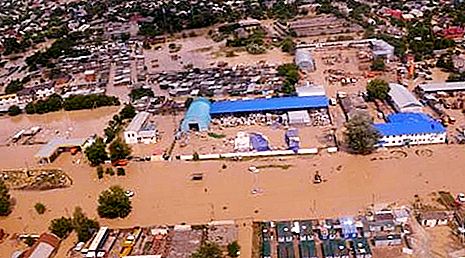Vladimir Solovyov was one of the largest Russian religious thinkers of the late XIX century. He became the author of several concepts and theories (about God-manhood, pan-Mongolism, etc.), which are still studied in detail by Russian philosophers.
early years
The future philosopher Solovyov Vladimir Sergeyevich was born on January 28, 1853 in Moscow, in the family of the famous historian Sergei Solovyov (author of the multivolume History of Russia from Ancient Times). The boy studied at the 5th gymnasium, and later entered the Physics and Mathematics Department of Moscow State University. From his youth, Soloviev read the works of German idealists and Slavophiles. In addition, he was greatly influenced by radical materialists. It was his passion for them that led the young man to the Faculty of Physics and Mathematics, however, after the second year he was transferred to the historical and philological. Impressed by materialist literature, the young Vladimir Solovyov even threw icons out of the window of his room, which made his father extremely angry. On the whole, his reading circle at that time consisted of Khomyakov, Schelling, and Hegel.
Sergei Mikhailovich instilled in his son industriousness and productivity. Every year he himself systematically published according to his "History" and in this sense became a clear example for his son. Already in adulthood, Vladimir wrote every day without exception (sometimes on torn pieces of paper when there was nothing else at hand).
University career
Already at the age of 21, Soloviev became a master and associate professor. The work he advocated was entitled “The Crisis of Western Philosophy”. The young man decided to get a degree not in his native Moscow, but in St. Petersburg. What point of view in his first scientific work did Vladimir Solovyov defend? The philosopher criticized positivism, then popular in Europe. After receiving a master's degree, he went on his first major foreign trip. The novice writer visited the Old World and the countries of the East, including Egypt. The voyage was purely professional - Solovyov became interested in spiritualism and Kabbalah. In addition, it was in Alexandria and Cairo that he began work on his theory of Sofia.
Returning to his homeland, Soloviev began to teach at St. Petersburg University. He met and became close with Fedor Dostoevsky. The author of The Brothers Karamazov, as the prototype of Alyosha, chose exactly Vladimir Solovyov. At this time, another Russian-Turkish war broke out. How did Vladimir Soloviev react to it? The philosopher almost went to the front as a volunteer, although he changed his mind at the last moment. Affected by his deep religiosity and rejection of the war. In 1880, he defended his thesis and became a doctor. However, due to a conflict with the rector of the university - Mikhail Vladislavlev - Soloviev did not receive the position of professor.
Termination of teaching
The year 1881 became a turning point for the thinker. Then the whole country was shocked by the murder by the revolutionaries of Tsar Alexander II. What did Vladimir Solovyov do under these conditions? The philosopher gave a public lecture in which he stated that it was necessary to have mercy on terrorists. This act clearly demonstrated the views and beliefs of Soloviev. He believed that the state has no right to execute people, even in response to the murder. The idea of Christian forgiveness forced the writer to take this sincere, but naive step.
The lecture led to scandal. About her it became known at the very top. The Minister of the Interior, Loris-Melikov, wrote a memorandum to the new Tsar Alexander III, in which he urged the autocrat not to punish the philosopher because of the deep religiosity of the latter. In addition, the author of the lecture was the son of a respected historian, once a rector of Moscow University. Alexander in his answer called Solovyov a “psychopath”, and his closest adviser Konstantin Pobedonostsev considered the offender before the throne “crazy”.
After that, the philosopher left St. Petersburg University, although no one formally dismissed him. Firstly, it was a matter of hype, and secondly, the writer wanted to focus more on books and articles. It was after 1881 that the period of creative prosperity began, which Vladimir Soloviev survived. The philosopher wrote without stopping, because for him it was the only way to make money.
Monk knight
According to the memoirs of contemporaries, Soloviev lived in monstrous conditions. He did not have a permanent home. The writer stayed in hotels or with many friends. Domestic imbalance had a bad effect on health. In addition, the philosopher regularly held a strict post. And all this was accompanied by intensive studies. Finally, Soloviev more than once was etched with turpentine. He treated this liquid as healing and mystical. Turpentine impregnated all of his apartments.
The ambiguous lifestyle and reputation of the writer inspired the poet Alexander Blok to call him in his memoirs a knight-monk. Solovyov's originality manifested itself literally in everything. The writer Andrei Bely left memories of him, which, for example, say that the philosopher had an amazing laugh. Some acquaintances considered him homeric and joyful, others - demonic.

Solovyov Vladimir Sergeevich often went abroad. In 1900, he returned to Moscow for the last time to submit his own translation of Plato's works to the publishing house. Then the writer felt bad. He was transported to Sergei Trubetskoy - a religious philosopher, publicist, public figure and student of Solovyov. His family owned the Uzkoye estate near Moscow. There, doctors arrived at Vladimir Sergeyevich who made a disappointing diagnosis - cirrhosis of the kidneys and atherosclerosis. The writer's body was exhausted from overwork at the desktop. He had no family and lived alone, so no one could follow his habits and influence Solovyov. Manor Uzkoye became the place of his death. The philosopher died on August 13, 1900. He was buried in the Novodevichy cemetery, next to his father.
God-manhood
A key part of Vladimir Solovyov’s legacy is his idea of God-manhood. This theory was first set forth by the philosopher in his Readings in 1878. Its main message is the conclusion about the unity of man and God. Soloviev criticized the traditional mass faith of the Russian nation. He considered habitual rituals "inhuman".
Many other Russian philosophers, like Solovyov, tried to comprehend the then state of the Russian Orthodox Church. In his teaching, the writer used the term Sophia, or Wisdom, which was to become the soul of a renewed faith. In addition, she has a body - the Church. This community of believers was to become the core of the future ideal society.
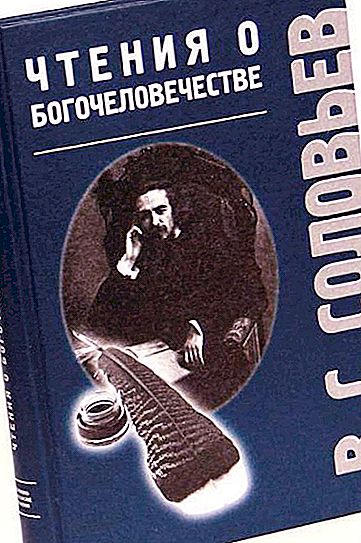
Soloviev in his Readings on God-Manhood claimed that the Church was in a serious crisis. It is fragmented and has no power over the minds of people, and new popular, but dubious theories, positivism and socialism, are claiming its place. Soloviev Vladimir Sergeevich (1853-1900) was convinced that the cause of this spiritual catastrophe was the Great French Revolution, which shook the usual foundations of European society. In 12 readings, the theorist tried to prove: only a renewed church and religion can occupy the formed ideological vacuum, where at the end of the 19th century there were many radical political theories. Soloviev did not live to see the first revolution in Russia in 1905, but he truly felt its approach.
Sophia concept
According to the philosopher’s idea, the principle of the unity of God and man can be realized in Sofia. This is an example of an ideal society based on Christian love for one's neighbor. Arguing about Sophia as the ultimate goal of the development of mankind, the author of “Readings” also raised the question of the universe. He described in detail his own theory of the cosmogonic process.
The book of the philosopher Vladimir Solovyov (10 reading) gives a chronology of the emergence of the world. In the beginning was the Astral era. The writer associated her with Islam. Then followed the Solar era. During it, the Sun, heat, light, magnetism and other physical phenomena arose. On the pages of his works, the theoretician associated this period with the numerous solar religious cults of antiquity - faith in Apollo, Osiris, Hercules and Adonis. With the advent of organic life on Earth, the last, Telluric era began.
This period was given special attention by Vladimir Soloviev. The historian, philosopher and theorist emphasized the three most important civilizations in the history of mankind. These peoples (Greeks, Indians and Jews) were the first to propose the idea of an ideal society without bloodshed and other vices. It was among the Jewish people that Jesus Christ preached. Soloviev did not regard him as an individual, but as a person who was able to embody all human nature. Nevertheless, the philosopher believed that much more material than divine was embedded in people. The embodiment of this principle was Adam.
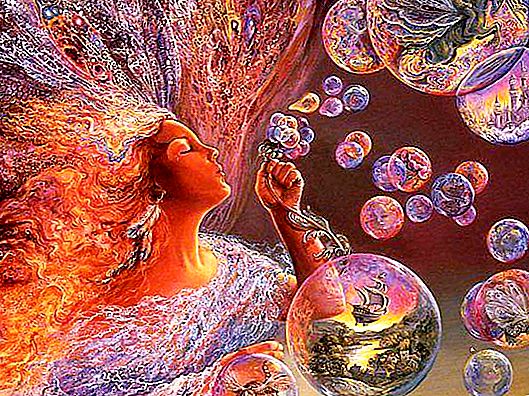
Speaking about Sofia, Vladimir Solovyov adhered to the idea that nature has its own single soul. He believed that humanity should be likened to this order, when all people have something in common. These views of the philosopher found another religious reflection. He was a Uniate (that is, advocated the unity of the churches). There is even a point of view that he converted to Catholicism, although it is disputed by biographers because of fragmentary and inaccurate sources. One way or another, but Soloviev was an active supporter of the unification of the Western and Eastern churches.
"Beauty in nature"
One of the fundamental works of Vladimir Solovyov was his article “Beauty in Nature, ” published in 1889. The philosopher examined this phenomenon in detail, giving him many assessments. For example, he considered beauty a way of transforming matter. At the same time, Solovyov urged to appreciate the beautiful in itself, and not as a means of achieving another goal. He also called beauty the embodiment of an idea.
Soloviev Vladimir Sergeyevich, whose brief biography is an example of the life of an author who touched on almost all spheres of human activity in his work, in this article also described his attitude to art. The philosopher believed that he always had only one goal - to improve reality and influence nature and the human soul. The discussion about the purpose of art was popular at the end of the 19th century. For example, Leo Tolstoy spoke with the same subject, with whom the writer indirectly polemicized. Solovyov Vladimir Sergeyevich, whose poems are less known than his philosophical works, was also a poet, so he talked about art from outside. "Beauty in nature" noticeably influenced the views of the intelligentsia of the Silver Age. The importance of this article for their work was noted by the writers Alexander Blok and Andrei Bely.
"The meaning of love"
What else did Vladimir Solovyov leave behind? God-manhood (its main concept) was developed in the series of articles “The Meaning of Love”, published in 1892-1893. These were not scattered publications, but parts of one whole work. In the first article, Solovyov refuted the idea that love is only a way of reproduction and continuation of the human race. Further, the writer compared its types. He compared in detail the maternal, friendly, sexual, mystical love, love for the Fatherland, etc. At the same time, he touched on the nature of egoism. For Solovyov, love is the only force capable of forcing a person to step over this individualistic feeling.
Indicative estimates of other Russian philosophers. For example, Nikolai Berdyaev considered this cycle "the most wonderful thing that was written about love." And Alexey Losev, who became one of the writer's main biographers, emphasized that Soloviev considered love to be a way to achieve eternal unity (and, therefore, God-manhood).
“Justification of the good”
The book “Justification of Good”, written in 1897, is the key ethical work of Vladimir Solovyov. The author planned to continue this work in two parts and, thus, to publish a trilogy, but did not manage to carry out his idea. In this book, the writer argued that the good is comprehensive and unconditional. First of all, because it is the basis of human nature. Soloviev proved the truth of this idea by the fact that from birth, all people are familiar with a sense of shame that is not brought up and not instilled from the outside. He called other similar qualities characteristic of man - reverence and pity.
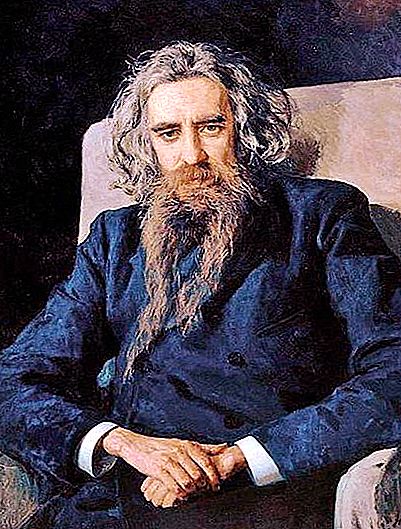
Good is an integral part of the human race, because it is also given from God. Soloviev, explaining this thesis, mainly used biblical sources. He came to the conclusion that the whole history of mankind is a process of transition from the kingdom of nature to the kingdom of the spirit (that is, from primitive evil to good). A good example of this is the evolution of ways to punish criminals. Soloviev noted that over time the principle of blood feud has disappeared. Also in this book, he once again opposed the use of the death penalty.
